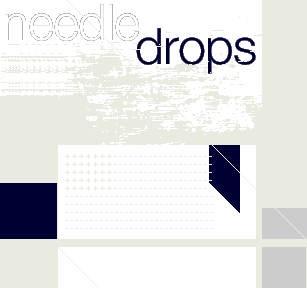


++ Contact Philip Sherburne ++
++ Recently ++
Tuesday, November 29, 2005 = The Stooges Unearthed (Again)
Tuesday, November 8, 2005 = Documenting Beulah And DCFC
Tuesday, November 1, 2005 = Out-Of-Control Rock 'N' Roll Is Alive And Well
Tuesday, October 25, 2005 = Just In Time For Halloween
Monday, October 3, 2005 = The Dandyesque Raunch Of Louis XI
Monday, August 15, 2005 = The Empire Blues
Tuesday, August 9, 2005 = David Howie's Sónar Diary
Monday, July 25, 2005 = Hot Sounds For Summertime
Monday, June 27, 2005 = Overcoming Writer's Block At Sónar 2005
Monday, June 4, 2005 = Cool New Sounds To Download Or Stream
++ Needle Drops Archives ++
View full list of Needle Drops articles...
|
|
 |
Friday, November 1, 2002
++ Megamix 3
++ Even in San Francisco, the days are getting shorter and the nights colder. So in the attempt to keep myself from rocking back and forth in my darkened room, singing the lyrics to This Mortal Coil's "Fond Affections" ("Now the winter's growing close/ The days are getting older/ ...There's no light at the end of it all/ Let's all sit down and cry"), I'm occupying myself with the stack of new discs next to my desk. Especially the crop of new releases from TGFKAI, The Genre Formerly Known As IDM, whose herky-jerky rhythms and hyperkinetic spray staves off depression as surely as garlic keeps vampires, and first dates, at bay. (Actually, the genre is still known as IDM, or "Intelligent Dance Music" — I've just come to hate the term so much that I'm willing to go to just about any lengths to avoid it.)
++ First up are a pile of headscratchers that'll have you saying, "Well, can you beat that!" Though what you ought to be saying is, "Well, can you Tigerbeat that?" Because Kid606's Tigerbeat6 label has come up with several of the season's most engaging discs in any genre. [Disclosure: I'm a friend of Miguel Depedro, a.k.a. Kid606, and we throw parties together. Further disclosure: I can hardly be said to like everything Tigerbeat6 puts out, especially the more twee and emo-IDM-oriented stuff — sorry, Miguel! — so this endorsement ought to actually mean something.]
Max Tundra's Mastered by Guy at the Exchange (a title whose punchline will have any diehard vinyl junkie chuckling — that phrase is etched into the wax of countless records manufactured at the London studio) is a blisteringly brilliant pileup of styles, moods, colors, textures, genres, references, and urges. If genre were a cat, this album might prove its definitive skinning. The clearly hyperactive Tundra (a.k.a. Ben Jacobs) has fed '60s pop, deep house, UK garage, video game melodies, DSP noise, indie rock, and more into a 38-minute blur a mere dozen songs long — and best of it all, it never forgets that it's a pop record.
Tympanis rub shoulders with Hammonds, and the disco lick lies down with the lazy R&B ripoff. This, I daresay, is the album Aphex Twin ought to have been trying to make during these last fruitless years of his, while he was tuning his tank and scrounging beneath the sofa cushions for forgotten Zip disks. It takes the bright-eyed wonder and impish play of I Care Because You Do and adds Jim O'Rourke's expert manipulation of melody and structure — and then promptly cartwheels away, before you can ask it too many questions.
Most amazingly, Max Tundra's not afraid to be sensitive (unlike so many genre pranksters). "Cabasa" begins with an oddly moving pastiche of the canned strings of classic Detroit techno and slowly blossoms into a vast, sprawling piano improvisation that would likely please Keith Jarrett's fans. And the faux garage of "Lights," with a vocal that sounds something like the Muppets' Beaker covering Craig David, can't help but be affecting when he sings, "Only last week/ I noticed that the colors of the lights in my studio/ Are the same as the ones you conjure in my mind/ ... When my Amiga reads from the disk/ You know the green fills the room/ And your lonesome dress fills my mind." It's almost a relief, listening to this song, to realize while that the world may be suffering from a kind of cultural ADD, the love song remains intact — simply sped up, processed and post-processed, and aerated like mosquito netting.
Dwayne Sodahberk's Don't Want to Know You is a different beast altogether. The Swedish techno artist sticks much closer to traditional forms of leftfield dance music, crafting swinging, stuttering, lopsided rhythm tracks that pitch and roll like small boats in mean waters. But if the record opens like a straightforwardly floor-oriented affair, it quickly succumbs to the waves, diving to some cold, scary depths. "Lagre (Long Play)" turns Boards of Canada-styled harpsichords inside out, extracting shrieking sonic guts that recall My Bloody Valentine and Scorn alike. "Participateur" finagles choppy hip-hop out of a mean electro crunch (cf. Two Lone Swordsmen). "Jan" is pure grindcore minus the beats — and so on. Still, it's not really a record of extremes. After every few rhythm tracks, Sodahberk stretches out to explore the noisy corners lurking in the shadows of the kickdrum, but he always comes back to the buzzsaw, hammer, and nails, building audaciously proportioned interiors that, for all the splinters, are eminently livable. What a homecoming.
Nathan Michel's ABC DEF, like Max Tundra's album, whips through all manner of moods, but it's less interested in pop structures, withholding immediate gratification in favor of a denser, deflected kind of pleasure. Much like Sack & Blumm, Michel traipses through melted analog melodies, scraps of found sound, and skittering, computer-born percussion. Too frazzled to sound naïve, Michel's Casio antics offer an addled take on lo-fi electronix. Finally, also from the twisted world of Tigerbeat6, Oakland resident Wobbly's Wild Why, which I discuss at greater length in the November issue of The Wire, is a staggering deconstruction of commercial urban radio, breaking down mainstream hip-hop and R&B into a sludge of guttural samples and low-end goo. I'm reminded of the two-headed parrot on "The Simpsons" that squawks out, "I shouldn't be!" This shouldn't either, in any logical universe, but we've long ago established that the rules holding our own world together bend wildly under even the slightest pressure.
++ With a much lower profile than Tigerbeat6, Manchester's Skam maintains a similarly catholic approach to genre, despite its standing as the quintessential IDM (I said it again) label. Early connections to Autechre, via the related group Gescom, didn't help them avoid that pigeonholing, of course; nor did the label's rep as the original home of Boards of Canada.
Following the ridiculously limited MASK series of a few years back — a Skam spinoff showcasing artists like Gescom, Boards of Canada, and Bola — over the past year Skam released a handful of 12-inches under the SMAK sublabel. Limited to 500 apiece, most of these disappeared almost immediately (despite retail prices of up to $20 per record). Perhaps attuned to the wholesale bootlegging that followed the MASK releases, Skam has released a double-CD set of all the SMAK tracks up until now, featuring lesser-known artists like Posthuman, Tatamax, Geiom, Massimo, and the excellent String Theory. Enterprising retail sleuths will be happy to discover the special edition, packaged in a vinyl Case Logic-style CD wallet, screen-printed with "SMAK Series Compliant Storage Unit." The tracks run the gamut from backfiring laser spray to upended ragga battery. Fans of the aggressive and abraded will eat it up; listeners with smoother sanded sensibilities are advised to seek out String Theory's Anhedonia on the Consumers Research and Development label.
Skam's real coup, though, is the forthcoming Freeform release, Human. Freeform, a.k.a. Simon Pyke (brother of the Designers Republic's Matt Pyke), has been putting out records since 1995, when he released "The Free EP" on Skam — the label's fourth release — and his debut album, Elastic Speakers, on Worm Interface. Freeform has always been drawn to the carnivalesque side of electronica, blending carousel melodies into complex, shifting rhythmic assemblages. Human is by far the best thing he's ever done, worlds ahead of last year's field-recording reworking, Audiotourism: Vietnam and China (Quartermass). It takes the polyrhythmic inclinations of Autechre and re-routes them through a more organic palette, infusing didgeridoos, bells, chirps, and like sounds with the pulse of a robotic St. Vitus' dance. Like Low Res' mindbending Blue Ramen (Plug Research), Human questions the very essence of "human" music, twisting improvisation and programming so tightly together that to extract one element would be to destroy the fiber of the music itself. Humming, clanking, droning, groaning, dithering, zithering, bashing, pointillizing, Pyke's music is all verb, and its component parts — scat, dub, techno, noise, song — are reduced to trace elements left floating in its wake. Human is one of 2002's great end-of-the-year surprises. Lend it an ear, and you'll find it seeping out your pores.
|
| |
|